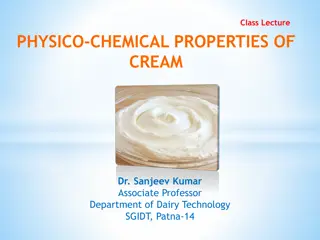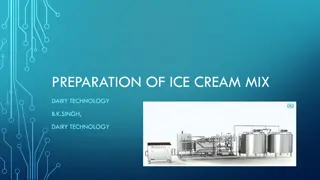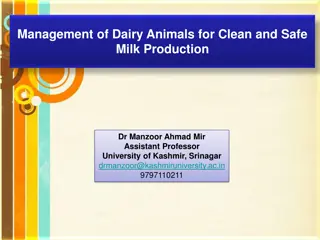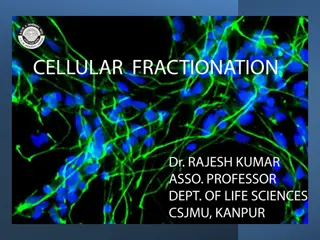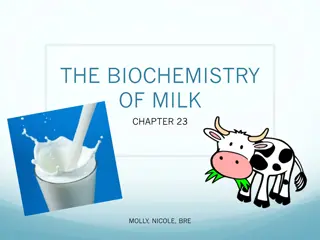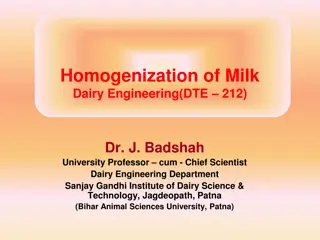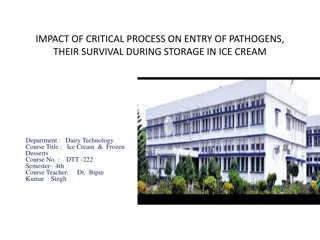Understanding the Physico-Chemical Properties of Cream
This informative material delves into the physico-chemical properties of cream, covering aspects such as viscosity, whipping quality, titratable acidity, specific gravity, and factors influencing viscosity. It discusses the influence of fat content, temperature, homogenization, cooling, aging, and c
0 views • 8 slides
Comprehensive Guide to Ice Cream Mix Preparation in Dairy Technology
Ice cream mix preparation is a crucial process involving selection of ingredients, formulation, blending, pasteurization, homogenization, cooling, and aging. Key components like dairy and non-dairy ingredients are carefully chosen to achieve the desired flavor, texture, and quality in the final ice
1 views • 19 slides
Dairy Animals Management for Clean & Safe Milk Production
Dairy animals need careful management for clean and safe milk production. This involves quality control at the farm, processing, and homogenization stages to ensure compliance with standards of identity and purity set by regulatory authorities. Inspectors play a crucial role in monitoring various pa
0 views • 27 slides
Cellular Fractionation: Techniques and Applications
Cellular fractionation is a crucial process for separating cellular components to study intracellular structures and proteins. It involves homogenization, centrifugation, and purification steps to isolate organelles based on their properties like density and shape. This method provides valuable insi
6 views • 11 slides
Exploring the Biochemistry of Milk: Components, Processing, and Health Benefits
Delve into the intricate world of milk biochemistry with a focus on its components, processing methods, and health implications. Learn about the proteins, fats, carbohydrates, minerals, and vitamins present in milk, as well as how they contribute to its complex nature. Discover the various processes
0 views • 15 slides
Enhancing Biological Context Annotation for AOPs: A Comprehensive Approach
Manual creation and homogenization of biological context annotations for AOPs and key events help in interlinking different AOPs to understand possible connections between pathways. The process involves compiling AOPs for various organisms, including humans and model species, annotating key events w
0 views • 13 slides
Understanding the Melting Process of Glass
The melting process of glass involves introducing a batch into a furnace at high temperatures for conversion into a glass melt through various chemical reactions such as decarbonation and dissolution. Initial heating releases moisture, and gas is released during decomposition, affecting homogenizati
0 views • 22 slides
Best Practices for Fresh Tissue Stability Testing
Establishing stability of fresh tissue samples is crucial for accurate residue analysis. Homogenization of tissue samples is recommended to ensure uniform distribution of analytes and prevent enzymatic activity. This process aids in maintaining sample integrity and minimizing freeze/thaw effects. Pr
0 views • 15 slides
Shifting Perspectives in Transnational Cinema Studies
Scholars across humanities are shifting towards a transnational approach in cinema studies to explore cultural identity in a globalized world. The chapter maps new ways to analyze Latin American cinema beyond national contexts, emphasizing the resistance to cultural homogenization and the preservati
0 views • 15 slides
The Science of Milk Homogenization in Dairy Engineering
Explore the principles and effects of homogenization on milk properties, including changes in fat globule size, viscosity, and enzyme activation. Discover the theory behind homogenization involving shearing, cavitation, and micro turbulence. Learn about the process of homogenization through high-vel
0 views • 8 slides
Protein Purification Protocol: Practical Training in Biochemistry Techniques
This protein purification protocol course, led by Dr. Samina Hyder Haq, focuses on practical training in various biochemistry techniques. The course covers organizing experimental protocols, protein isolation strategies, sequential enzyme purification, enzyme kinetics, and writing scientific reports
0 views • 25 slides
Impact of Critical Process on Pathogen Entry and Survival in Ice Cream Manufacturing
The critical processes in ice cream manufacturing, such as pasteurization, homogenization, and chilling, play a crucial role in reducing pathogens and microorganisms, ensuring product safety. Pasteurization at specific temperatures and times effectively eliminates pathogenic organisms, while homogen
0 views • 9 slides
